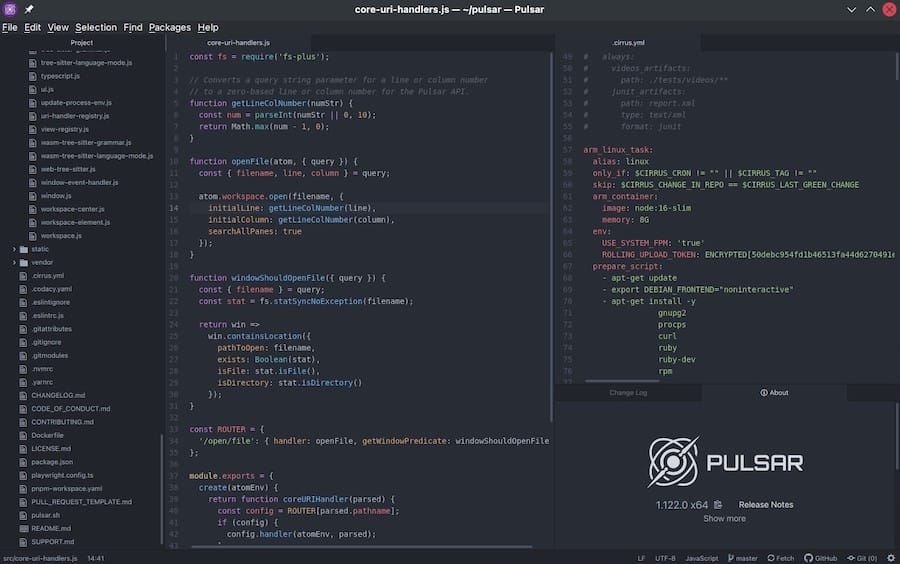How To Install Pulsar Code Editor on Ubuntu 24.04 LTS

In the ever-evolving world of software development, having a powerful and versatile code editor is essential for programmers of all levels. Pulsar Code Editor has emerged as a popular choice among developers, offering a robust set of features and a user-friendly interface. This article will guide you through the process of installing Pulsar Code Editor on Ubuntu 24.04, the latest long-term support release of the popular Linux distribution. Whether you’re a seasoned developer or just starting your coding journey, this step-by-step guide will help you set up Pulsar and unlock its full potential on your Ubuntu system.
What is Pulsar Code Editor?
Pulsar Code Editor is a modern, open-source text editor designed for coding and development tasks. It is a community-driven fork of the Atom editor, which was discontinued by GitHub in December 2022. Pulsar aims to continue the legacy of Atom while introducing new features and improvements.
Key features of Pulsar Code Editor include:
- Cross-platform compatibility (Windows, macOS, and Linux)
- Customizable and hackable interface
- Built-in package manager for easy extension
- Smart autocompletion and syntax highlighting for various programming languages
- Git integration for version control
- Multiple panes and split-screen editing
- Powerful search and replace functionality
Compared to other popular code editors like Visual Studio Code or Sublime Text, Pulsar offers a balance between feature-rich functionality and a lightweight, responsive interface. Its extensibility through packages makes it adaptable to various development workflows and preferences.
System Requirements
Before proceeding with the installation of Pulsar Code Editor on Ubuntu 24.04, ensure that your system meets the following requirements:
- Ubuntu 24.04 LTS (Lunar Lobster) installed and up to date
- At least 4GB of RAM (8GB or more recommended for optimal performance)
- 1GB of free disk space
- Intel or AMD x86-64 processor
- Active internet connection for downloading packages and updates
Additionally, make sure you have administrative privileges on your Ubuntu system to install software and make system-wide changes.
Preparation Steps
Before installing Pulsar Code Editor, it’s crucial to prepare your Ubuntu 24.04 system. Follow these steps to ensure a smooth installation process:
- Update your system:
sudo apt update && sudo apt upgrade -y - Install essential dependencies:
sudo apt install software-properties-common apt-transport-https wget -y - Ensure that you have the necessary graphics drivers installed for your system. This can typically be done through the “Software & Updates” application under the “Additional Drivers” tab.
- If you have any other code editors installed, such as Atom or Visual Studio Code, consider backing up your settings and projects before proceeding with the Pulsar installation.
By completing these preparation steps, you’ll minimize the risk of encountering issues during the Pulsar installation process.
Installation Methods
There are several methods to install Pulsar Code Editor on Ubuntu 24.04. We’ll cover three popular approaches: using the official AppImage, installing via the Snap Store, and building from source. Choose the method that best suits your preferences and needs.
Method 1: Using the Official Pulsar AppImage
AppImage is a universal package format that allows you to run software without installation. This method is straightforward and doesn’t require any system-wide changes.
- Download the latest Pulsar AppImage from the official GitHub releases page:
wget https://github.com/pulsar-edit/pulsar/releases/latest/download/Pulsar-linux-x64.AppImage - Make the AppImage executable:
chmod +x Pulsar-linux-x64.AppImage - Run Pulsar directly from the AppImage:
./Pulsar-linux-x64.AppImage - Optionally, move the AppImage to a more convenient location:
mv Pulsar-linux-x64.AppImage ~/Applications/ - Create a desktop shortcut for easy access:
echo "[Desktop Entry] Name=Pulsar Exec=$HOME/Applications/Pulsar-linux-x64.AppImage Icon=$HOME/Applications/Pulsar-linux-x64.AppImage Type=Application Categories=Development;TextEditor;" > ~/.local/share/applications/pulsar.desktop
Using the AppImage method allows you to easily update Pulsar by downloading the latest AppImage and replacing the existing one.
Method 2: Using the Snap Store
Ubuntu 24.04 comes with Snap support pre-installed, making it easy to install Pulsar using this containerized software package system.
- Ensure that snap is up to date:
sudo snap refresh - Install Pulsar via snap:
sudo snap install pulsar - Verify the installation:
snap list pulsar - Launch Pulsar from the application menu or by running:
pulsar
The Snap Store method ensures that you always have the latest stable version of Pulsar, as updates are managed automatically through the Snap system.
Method 3: Building from Source
For users who prefer to have more control over the installation process or want to contribute to Pulsar’s development, building from source is an option. This method requires more technical knowledge but allows for customization.
- Install necessary build dependencies:
sudo apt install git nodejs npm build-essential -y - Clone the Pulsar repository:
git clone https://github.com/pulsar-edit/pulsar.git - Navigate to the Pulsar directory:
cd pulsar - Install project dependencies:
npm install - Build Pulsar:
npm run build - Start Pulsar:
npm start
Building from source allows you to stay on the cutting edge of Pulsar development and potentially contribute to the project. However, keep in mind that this method requires more maintenance and manual updates.
Post-Installation Configuration
After successfully installing Pulsar Code Editor, it’s time to configure it for optimal use. Here are some essential steps to get you started:
- First Launch:
- When you first open Pulsar, you’ll be greeted with a welcome screen.
- Take a moment to explore the initial setup options, including theme selection and core settings.
- Customizing the User Interface:
- Navigate to “Edit” > “Preferences” to access Pulsar’s settings.
- Experiment with different themes, font sizes, and layout options to find your preferred setup.
- Consider enabling features like “Soft Wrap” for improved readability of long lines of code.
- Installing Essential Packages:
- Open the package manager by going to “Edit” > “Preferences” > “Install”.
- Search for and install packages that enhance your coding experience, such as:
- language-specific packages for syntax highlighting and autocompletion
- linter packages for code quality checks
- git-plus for enhanced Git integration
- file-icons for improved file type recognition
- Configuring Project-Specific Settings:
- Create a `
.pulsar` folder in your project root to store project-specific configurations. - Use the `
config.cson` file within this folder to set project-level preferences.
- Create a `
Take time to explore Pulsar’s settings and packages to tailor the editor to your specific needs and workflow. The extensibility of Pulsar allows for a highly personalized development environment.

Troubleshooting Common Issues
While installing and using Pulsar Code Editor on Ubuntu 24.04, you may encounter some issues. Here are solutions to common problems:
Dependency Conflicts
If you experience dependency conflicts, try the following:
- Update your system:
sudo apt update && sudo apt upgrade -y - Install any missing dependencies manually using apt
- If using the AppImage, try downloading a fresh copy from the official repository
Permission Issues
For permission-related problems:
- Ensure you have the necessary permissions to write to the installation directory
- Run Pulsar with elevated privileges for troubleshooting:
sudo pulsar(not recommended for regular use) - Check and correct file ownership:
sudo chown -R $USER:$USER ~/.config/pulsar
Performance Concerns
If Pulsar is running slowly:
- Disable unnecessary packages and features
- Increase the memory limit in Pulsar’s settings
- Ensure your system meets the recommended hardware requirements
- Consider using the AppImage version for potentially better performance
If problems persist, consult the Pulsar community forums or GitHub issues for more specific troubleshooting advice.
Updating Pulsar Code Editor
Keeping Pulsar up to date ensures you have the latest features and security patches. The update process varies depending on your installation method:
- AppImage: Download the latest AppImage and replace the existing one
- Snap: Updates are handled automatically, or use
sudo snap refresh pulsar - Built from source: Pull the latest changes from the Git repository and rebuild
Regularly check for updates to maintain optimal performance and security of your Pulsar installation.
Uninstalling Pulsar
If you need to remove Pulsar from your Ubuntu 24.04 system, follow these steps based on your installation method:
- AppImage: Simply delete the AppImage file and the desktop shortcut
- Snap: Run
sudo snap remove pulsar - Built from source: Delete the cloned repository and remove any manually created shortcuts
After uninstallation, you may want to remove any remaining configuration files:
rm -rf ~/.config/pulsar
rm -rf ~/.pulsarThis ensures a clean removal of Pulsar from your system.
Congratulations! You have successfully installed Pulsar. Thanks for using this tutorial to install the latest version of the Pulsar Code Editor on Ubuntu 24.04 LTS. For additional help or useful information, we recommend you check the official Pulsar website.